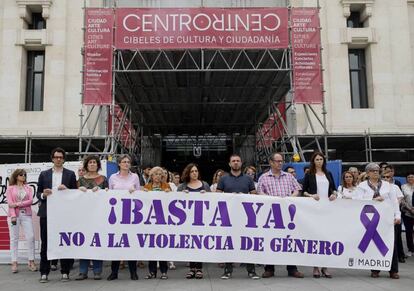Women’s uphill struggle against street harassment in Spain
Unwanted remarks are a part of life for girls and women while society looks on, but changes are afoot

For many women, wearing longer skirts, traveling in groups and having an emergency contact on speed dial in case they run into a menacing stranger are all common practices. They have all had to deal with various forms of street harassment, including intimidating stares, unsolicited remarks, unwanted photographs and stalking.
Elena G., a 26-year-old who works in advertising, had one such experience a year ago, and she often still replays it in her mind.
If I see a beautiful woman I tell her that she’s beautiful, but I am not at all a violent man
Luis José, construction worker
“I was waiting on the train platform when I noticed a man, around 40 years old, who was staring at me,” she recounts. “When the train pulled into the station he sat very near me. I got off to switch trains and he got off right behind me. I started walking faster, looking behind me, and he boarded the same train. At my stop, I ran out. Two seconds later he was right behind me again. I knew that if he reached me, something bad would happen.”
“Of the four platform exits, he specifically chose mine,” she continues. “I was really scared by then. There were no people around, I was carrying a suitcase, and sweating as I tried to run. It’s a good thing my apartment building is near the subway entrance. I had my keys in my hand, so I unlocked the front door quickly, and when I looked again, with the door now closed, he was still staring at me. I felt this horrible fear inside. When this man saw he didn’t have time to do anything to me, he went down into the subway again. I knew I wasn’t crazy, that this man had wanted to do something bad to me.”
She did not tell her parents about it because she did not want them to worry. But she did tell her friends. None of her male acquaintances had ever been through anything similar.

But other women have: Luz Bianco, 23, says she covers herself up “as much as possible” when she’s wearing a dress, to avoid catcalls; Rosa López, 23, has her boyfriend’s number ready to dial when she is walking home alone; Mireia Bonilla, 27, is convinced that there are men out there with “repugnant behavior,” and Elena Pérez, 26, recently asked a male friend to walk her right to her door after seeing an unknown man inside her building.
Some associations, such as Levanta la Voz Madrid (Raise your Voice Madrid), are trying to fight this fear. Blanca Fernández, a 22-year-old flight attendant, joined the group after enduring 10 years of street harassment herself.
“Many women try to go by unnoticed on the streets,” she says. “We cover up, we are forced to live in a bubble.” The worst part is that street harassment “is so frequent that it is viewed as normal.” It is assumed that being a woman automatically entails putting up with this behavior.
The problem begins during the teenage years. “Around 71% of women start suffering street harassment between the ages of 11 and 17, that is to say, when they are still underage,” explains Fernández.
Boys must be educated to treat girls as equals
María Naredo, Madrid Gender Violence Support Agency
María Naredo, general director of the Madrid Gender Violence Prevention and Support Agency, says “that the goal of all these episodes of violence and micro-violence is to put women in a place where they have less freedom of movement.” This means that public institutions must step in.
The state Pact against Gender Violence includes instructions to conduct a major survey on the issue of street harassment, and women’s views of it. This agreement also establishes information campaigns so that “society will react and end its silent complicity.”
The city of Madrid has also joined the Safe Cities and Safe Public Spaces initiative run by UN Women. Naredo says that “boys must be educated to treat girls as equals, while girls must be taught that it’s not about seeking out protectors, but about establishing relationships between equals.”
According to Spain’s criminal code, following a woman down the street on one occasion is not a crime; this is only the case if it happens several times. Nor are there any penal consequences for staring at women or making remarks about physical appearance.
That is why it is important to socially reject these practices, says Naredo. “We need to understand that these episodes of micro-violence are part of the roots of sexist violence.”
This idea had never occurred to Luis José, a 43-year-old construction worker, or to any of his colleagues. Luis José, who declined to give his last name, admits that he regularly “compliments” women who pass by while he’s working. “If I see a beautiful woman I tell her that she’s beautiful, but I am not at all a violent man,” he says. “I didn’t think it bothered them. Now I know.”
English version by Susana Urra.
Tu suscripción se está usando en otro dispositivo
¿Quieres añadir otro usuario a tu suscripción?
Si continúas leyendo en este dispositivo, no se podrá leer en el otro.
FlechaTu suscripción se está usando en otro dispositivo y solo puedes acceder a EL PAÍS desde un dispositivo a la vez.
Si quieres compartir tu cuenta, cambia tu suscripción a la modalidad Premium, así podrás añadir otro usuario. Cada uno accederá con su propia cuenta de email, lo que os permitirá personalizar vuestra experiencia en EL PAÍS.
¿Tienes una suscripción de empresa? Accede aquí para contratar más cuentas.
En el caso de no saber quién está usando tu cuenta, te recomendamos cambiar tu contraseña aquí.
Si decides continuar compartiendo tu cuenta, este mensaje se mostrará en tu dispositivo y en el de la otra persona que está usando tu cuenta de forma indefinida, afectando a tu experiencia de lectura. Puedes consultar aquí los términos y condiciones de la suscripción digital.








































